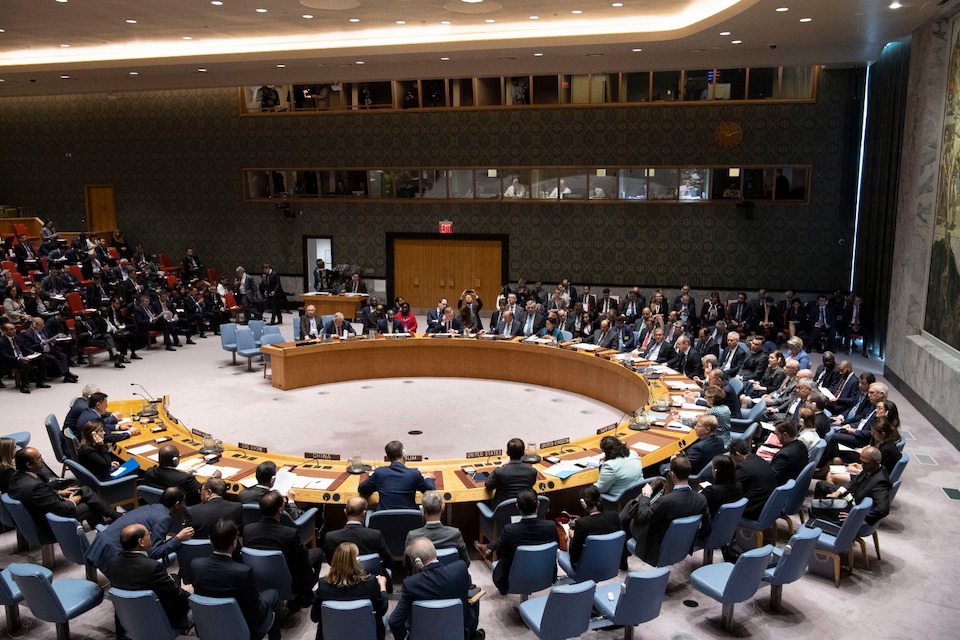A holistic approach to supporting peace and security in Africa
Statement by Ambassador Jonathan Allen, UK Deputy Permanent Representative to the UN, at the Security Council briefing on peace and security in Africa.

Thank you very much, Mr President. And I’d just like to welcome today all Ministers to this council. The Foreign Secretary, Dominic Raab, had wanted to make the UK’s intervention today, but he’s had to return to London for urgent parliamentary business.
Mr President, the United Kingdom is a staunch supporter of the African Union’s vision for silencing the guns in Africa. And as we’ve heard today, real progress is already underway towards this noble goal, driven primarily by African leaders, civil society and communities. And it’s important that we see an integrated United Nations approach across the three UN pillars in support of that goal.
The African Union and the African regional economic communities are indispensable partners in maintaining peace and security on the African continent. So, Mr President, the United Kingdom applauds the joint efforts of the African Union and the United Nations in fostering dialogue and mediating peace negotiations across Africa. Those efforts, together with those of subregional organizations, have borne real fruit in 2019. They have supported the transition to civilian led government in Sudan. And we were glad that all members of the Council, of the Security Council, were eventually able to support the African Union’s position in Sudan and of course, a new Peace Agreement in the Central African Republic. And we hope all members of this Council will lend their full support to the implementation of the Peace Agreement in the Central African Republic and refrain from any destabilizing bilateral activity there.
Mr President, I hope that Chairperson Faki and Secretary-General Guterres will continue to exert their good offices in the region in the coming months. That’s vital to help resolve and prevent conflict, for example, by encouraging progress on the implementation of the Peace Agreement in South Sudan and supporting the recently announced national dialogue process in Cameroon. Cooperation and coordination on a range of peace and security issues is a vital element of the UK-AU strategic partnership. In Somalia the United Kingdom has deployed military personnel through the United Nations to support AMISOM in addition to our extensive bilateral support to the Somali security forces.
Mr President, we recognise the African Union’s vital role in peace enforcement activity. That is why we support, in principle, access to UN-assessed contributions for future AU-led African peace support operations on a case by case basis and subject to certain key conditions. And in that context, I hope that all member states, especially those which most support this proposal, will back posts designed to support the necessary standards of compliance in AMISOM in the fifth committee this year. Mr President, the United Kingdom’s support for Africa’s peace and stability is perhaps most obvious in our defence and security partnerships. Our armed forces train thousands of their African counterparts through long term training programs.
Just this summer, UK forces provided military training to the latest Malawian battalion about to deploy to MINUSCO in the DRC. And as our own deployment to South Sudan ends in 2020, we will begin contributing British troops to MINUSMA in Mali. The United Kingdom’s experts are also working across the continent to help build African capacity to tackle a range of security threats. To take just a few, those include terrorism in Somalia, Nigeria and Kenya, the illegal drugs trade in Tanzania and wildlife trafficking in Malawi and Zambia.
We are also supporting African security forces to prevent sexual violence in conflict and to implement the broader women, peace and security agenda. There can be no meaningful global debate on these topics, which does not include the voices of African women and girls. And they will be central to the global conference we are hosting this November in London on preventing sexual violence in conflict. Women and girls also have a wider role to play in preventing and resolving conflicts and in building sustainable peace. And we know the research, which says that peace processes which are inclusive of women are 35 per cent more likely to last for a period of 15 years or longer. Women are at the heart of many of the initiatives we support to find political solutions to conflict in Africa, such as the African Union’s Femwise network and the Commonwealth Network of women mediators.
However, Mr President, we must look beyond current crises. The African Union’s own Agenda 2063 recognises that stability, security, good governance and inclusive economic development are inextricably intertwined. Africa’s long term stability and success will depend in part on whether the 20 million young Africans who join the job market each year see meaningful prospects for filling their enormous potential.
They will struggle to do so wherever conflict, corruption or the impacts of climate change constrain human capital investment and entrepreneurship. As one of the biggest development donors in Africa we will continue to focus on working with African partners on issues which will improve the lives of African citizens. This includes job creation, quality education, healthcare and access to family planning and climate resilience. And we will provide support to mobilise the high quality private investment which the region needs, including through a major UK Africa Investment Summit in London in early 2020.
Mr President, the United Kingdom will remain committed to a holistic approach to supporting peace and security in Africa, recognising the mutually reinforcing links between security, prosperity and good governance. And we will continue to work with and through partnerships across the region, recognising that it is Africans themselves who shape their continent’s future.